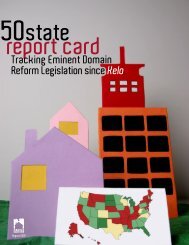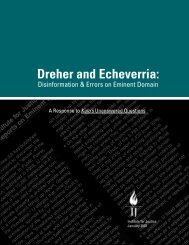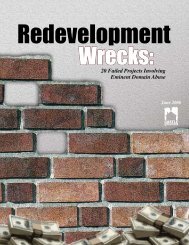Public Power, Private Gain - The Castle Coalition
Public Power, Private Gain - The Castle Coalition
Public Power, Private Gain - The Castle Coalition
You also want an ePaper? Increase the reach of your titles
YUMPU automatically turns print PDFs into web optimized ePapers that Google loves.
<strong>The</strong> Eminent Domain Process andthe Ordinary CitizenFor many people, the first time they hear the term “eminent domain” is when they hear that someoneis planning a shopping mall or condominium project and the location being talked about sounds suspiciouslylike their home. Local bureaucrats begin to praise the upcoming project. <strong>The</strong>y talk about thousandsof jobs and increased tax revenues. And they say things like, “we plan to work together in partnershipwith the community.” Eminent domain will be used only “if necessary” and “as a last resort.”Sometimes there are public meetings before a redevelopment agency and/or city council. <strong>The</strong>se hearingscan be for approval of the project or for designation of the area as “blighted.” Blight designationsmake it easy to condemn property and transfer it to private developers. People are often astonished thatthe government would call their property blighted, because the ordinary person pictures blight as rats andbuildings that are falling down. Instead, cities can declare anything blighted that wasn’t built in the last fewyears. Modern characteristics of “blight” include too-small side yards, “diverse ownership” (different peopleown properties next to each other), “inadequate planning,” and lack of a two-car attached garage.Cities will even declare areas to be blighted that have no current blight but might be blighted in the future.Owners attend these public hearings, beg, and are usually ignored by the government planners, whohave made up their minds and reached preliminary agreements with developers long before the hearingstarted.Occasionally, and more frequently in recent years, the public outcry against using eminent domainfor private parties will actually make an impression on the city leaders who thought the project was adone deal. This report describes a number of instances where people succeeded in fending off governmentattempts to grab their land.Once the project is authorized, someone begins contacting property owners and trying to purchasethe properties. At this point, some people are willing to sell. Some people feel like they will move for theright price. And some people do not want to move at all.If someone says that her home or business is not for sale, she is told that if she does not sell, theproperty will be taken by eminent domain. <strong>The</strong>n the owner must face a choice—whether to accept theloss of her beloved home, business or neighborhood and try to strike the best arrangement she can orwhether to stand her ground and fight.If the owner refuses to sell, the government (or, in a few states, a private party) files a condemnationlawsuit against the person. In many states, governments are authorized to “quick-take” property. Underquick-take, if the government deposits its estimate of compensation with the court, it can take immediatetitle to the property and get possession immediately or withina few months. That means the property is immediately bulldozed,leaving the owner to fight in court about whether thenow-empty lot that remains was legally condemned.Increasingly in recent years, courts actually hold that thegovernment has gone too far and cannot take the home orbusiness it is trying to seize through eminent domain.5





